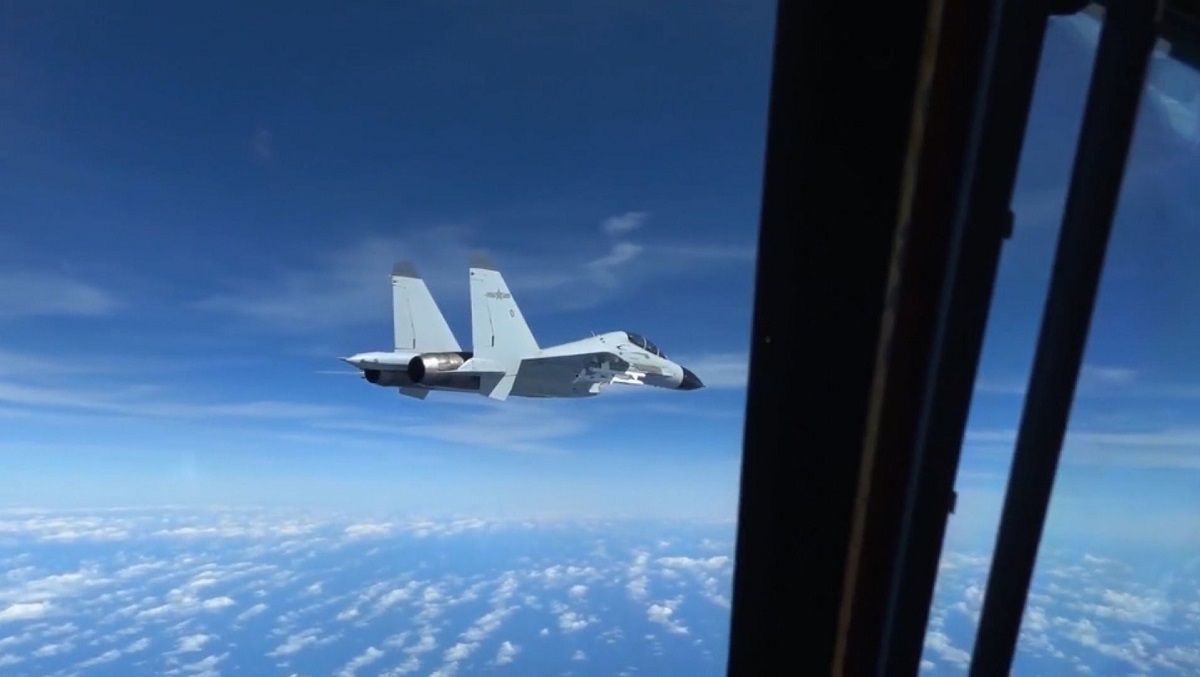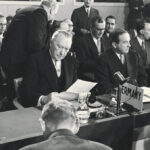
It’s time once again to feature some of the smart conversations that occur around the country through the Eisenhower Series College Program. For over 50 years, the Eisenhower Program has reached out to colleges and town halls across the nation to introduce War College students to audiences that are often unfamiliar with members of the U.S. military. This episode features Ajai Dabas, Wade Smith and Matthew Taylor discussing great power competition. They join podcast editor Ron Granieri to discuss their professional experiences, primarily in the Indo-Pacific theater. Their insights highlight not only China’s actions and motivations in the region but, more importantly, the crucial importance of alliances as well. All three guests share their thoughts on strong partnerships in INDOPACOM as the primary tool to defeat unchecked Chinese aggression and expansion.
The problem is that the People’s Republic of China has achieved a level of military power that has allowed them to take things that don’t belong to them, knowing that their neighbors like Malaysia, Brunei, Vietnam, the Philippines do not have the power to deny them.
Podcast: Download
Subscribe: Apple Podcasts | Spotify | Amazon Music | Android | Pandora | iHeartRadio | Blubrry | Podchaser | Podcast Index | TuneIn | Deezer | Youtube Music | RSS | Subscribe to A Better Peace: The War Room Podcast
Ajai Dabas is a brigadier general in the infantry of the Indian Army and has worked in special forces. His last position before attending the War College was as a brigade commander. He is an international fellow and member of the AY24 Resident Course at the U.S. Army War College and the Eisenhower Series College Program.
Wade Smith is an aircraft maintenance officer and a lieutenant colonel in the U.S. Air Force Reserve. He has served in a wide variety of organizations, most recently as an action officer on the Air Staff at the Pentagon, where he focused on leadership development for the Air Force’s maintenance officer corps. In his civilian capacity, he serves as the Director of Operations for the Air Force and Space Force’s Personnel Exchange Program within Europe, the Middle East, and Africa. Wade is a member of the AY24 Resident Course at the U.S. Army War College and the Eisenhower Series College Program.
Matthew Taylor is a lieutenant colonel and Air Force Special Operations pilot, primarily flying the MC-130J aircraft. He has spent 12 years of his 18-year career overseas, planning and executing special operations missions in hostile and politically-sensitive environments in Asia, the Middle East, Africa and Europe. Most recently, Lt Col Taylor led the 1st Special Operations Squadron in Okinawa, Japan, an 80-person unit conducting missions throughout the Department of Defense’s largest and most diverse theater. He is a member of the AY24 Resident Course at the U.S. Army War College and the Eisenhower Series College Program.
Ron Granieri is Professor of History and the Chair of the Department of National Security and Strategy at the U.S. Army War College and the Editor of A BETTER PEACE.
The views expressed in this presentation are those of the speakers and do not necessarily reflect those of the U.S. Army War College, U.S. Army, or Department of Defense.
Photo Description: On December 21, 2022, a Chinese Navy J-11 fighter jet flew within 20 feet of the nose of an RC-135 Rivet Joint, a U.S. Air Force reconnaissance plane with about 30 people on board. In response, the RC-135 had to take “evasive maneuvers to avoid a collision,” INDOPACOM said in a statement. The RC-135 was in international airspace over the South China Sea and was “lawfully conducting routine operations,” INDOPACOM said.
Photo Credit: DoD Photograph





As we now move to consider such things as great power competition, alliances, etc., are such things as cultural imperialism, cultural integrity and/or ideology of exceptional importance today? If so, then is one side or another (which) showing itself to be more committed to “winning” today via these such things? Also, is one side or another doing a better job of employing, deploying and utilizing such things as cultural integrity, cultural imperialism and/or ideology more throughout the world today? As to the importance of these such questions, consider the following:
a. From Hans Morgenthau’s “Politics Among Nations: The Struggle for Power and Peace,” Brief Edition, New York: McGraw Hill, 1993, Page 72:
“Cultural imperialism is the most subtle and, if it were ever to succeed by itself alone, the most successful of imperialistic policies. It aims not at the conquest of territory or at the control of economic life, but at the conquest and control of the minds of men as an instrument for changing the power relations between two nations. If one could imagine the culture and, more particularly, the political ideology … of State A conquering the minds of all the citizens determining the policies of State B, State A would have won a more complete victory and would have founded its supremacy on more stable grounds than any military conqueror or economic master.” And:
b. From the September 9, 2022 “The Diplomat” article by Ian Easton entitled “Xi Jinping’s Endgame for America: Xi’s speeches make clear that he is committed to spreading China’s model of communism around the world”.”
“Welcome to Cold War II. As Xi himself said in an internal speech to the PLA, ‘When it comes to combat in the ideology domain, we don’t have any room for compromise or retreat. We must achieve total victory.’ ”
Concluding questions:
As to such things as great power competition, alliances, etc. — considered from the cultural integrity, cultural imperialism and/or ideological point of view that I present above — should the fact that nations such as India, etc., today have — together and generally at the same time as China and Russia — (a) now moved away from the more market-oriented culture and ideology of the U.S./the West and have now (b) moved more towards the traditional values culture and ideology introduced by China and Russia recently — should this fact (and the fact that, as per this such common and simultaneous movement, these folks might consider themselves to be natural allies of one another) concern us? This, especially, given that this such trend, most assuredly, is also presenting itself — and potentially “winning” — in the U.S./the West today also? (Thus, consider this such great power competition trend — and its consequences — from the perspective offered by Hans Morgenthau above?)
Another way of looking at the matters that I present above, this is by considering that in the war on terrorism, i.e., a conflict between the U.S./the West and smaller state and non-state entities (who do not wish to be transformed more along contemporary/ultra-modern western political, economic, social and/or value lines and who will use such things as their traditional values to prevent these such wanted transformations); this such conflict has now been overshowed (but not replaced) by great power competition, i.e., a conflict between the U.S./the West and larger states and societies (who, likewise, do not wish to be transformed more along contemporary/ultra-modern western political, economic, social and/or value lines and who, likewise, will use such things as their traditional values to prevent these such unwanted transformations).
We might even say that these two conflicts (the war on terror and the great power competition cases noted above), they, themselves of late, have now been overshadowed by the internal conflict that is taking place within the U.S./the West itself; wherein — much like in the war on terror and the great power competition cases noted above — now even individuals and groups within the U.S./the West — likewise threatened by transformation more along contemporary/ultra-modern western political, economic, social and/or value lines — are (a) using such things as their traditional values; this, (b) to try to prevent — and/or to try to roll back and/or reverse — these such unwanted changes?
(Note: The fact that in the current war on terror, in the current great power competition and in the current internal conflict within the U.S./the West itself; the fact that in all of these conflict cases a common defense approach is being utilized by our diverse opponents — to wit: an appeal to such things as traditional values — what does this tell us about our chances of “winning?”)
Regarding my initial two comments above, might the following — from the University of Cambridge paper “The World has Divided into Liberal and Illiberal Spheres,” by Dr Xavier Romero-Vidal, also prove useful?:
“Among the 1.2 billion people who inhabit the world’s liberal democracies, three-quarters (75%) now hold a negative view of China, and 87% a negative view of Russia, according to the report, published today by the University’s Centre for the Future of Democracy (CFD).
Yet among the 6.3 billion who live in the world’s remaining 136 countries, the opposite is the case – with 70% of people feeling positively towards China and 66% towards Russia.
The analysis includes significant public opinion data from emerging economies and the Global South, and suggests this divide is not just economic or strategic but based in personal and political ideology. …
On one side of the new divide are what researchers call the ‘maritime alliance’, with principles based in free flows of trade and ideas, and the protection of individual rights.
These countries include much of Europe and more stable parts of the Americas and Australasia. Their lodestar is still primarily the US, despite the disturbance of the Trump presidency.
The opposing cluster is centered on a ‘Eurasian Bloc’ anchored by China and Russia, with links across the continent to Central Asia, Iran and the Arab Middle East, as well as large parts of Africa and Southeast Asia.
Researchers say that some comparisons to the Cold War era still hold, as this latter group is broadly united in a rejection of ‘western modernity’ and liberal values. …
China offers a model of authoritarian modernisation in which personal liberties are forsaken for the promise of economic growth and national prestige.
The relative appeal of China versus the United States may not simply be a question of America’s attractiveness as an ally, but as a political model.
In an attempt to come full circle now, note that, as per Hans Morgenthau in my initial comment above,
States “A” (in this case, Russia and China) — and re: their political ideology which rejects critical aspects of western modernity and liberal values — these such States “A” seem posed to conquer (and/or have already conquered?) the minds of many of the citizens in States “B.” (In this regard, consider [a] the minds of the 6.3 billion people noted in the quoted item in my comment immediately above and [b] the minds of many of the people in the U.S./the West’s more conservative parties today?)
As such, and as per Morgenthau above, States “A” (Russia and China) seem posed to “win a more complete victory — and found their new supremacy — on more stable grounds than any military conqueror or economic master could hope to achieve.”?
(So much for all our military plans and preparations for the Indo-Pacific ???? )
Questions — based on the above:
Q: How did we get into this fix? (A: By seeking to advance what might be called “radical liberalism” — too far and too fast — both here at home and there abroad after the Old Cold War?) And:
Q: How do we get out of this fix? (I do not know. If we abandon certain aspects of our post-Cold War “radical liberalism” effort — either here at home and/or there abroad — this, in order to take some of the “wind” out of the “sails” of our more-illiberal opponents — then do we not, thereby, [a] simply bring about our opponents’ victory more quickly and thoroughly and [b] embarrassingly acknowledge the error of our post-Cold War ways?)
Sir, in response to your above questions: we, America, have foolishly arrived here, a very dangerous place, because we failed to listen to communist defectors. The “Iron Curtain” didn’t “fall”. It was a clever strategic move by the communist party. China and Russia are aligned against the US; Israel pretends to be everyone’s ally to acquire and transfer tech and resources to whomever it feels benefits Israel the most. The game is outlined in Sun Tzu’s Art of War. We, America, have been steadily infiltrated by the communist party, (aka social democrats, etc ), seeding our society via psychological and cultural propaganda. And it has worked. So, yes, (second answer), we have been duped by our adversaries into destroying our own nation. Unless we face that reality, as unpleasant as it may be, we have no hope at retaining and rebuilding our Republic. We have been sold out, piece by piece, by traitors within.
Savannah:
As to my question above, “How did we get into this fix,” (i.e., the “fix” in which the more illiberal ideologies of China and Russia may have become more popular with populations around the world than our more liberal ideologies); as to this such question, might this be best understood from the perspective offered by authors Robert Gilpin and Jerry Muller below?
Gilpin: ““Capitalism is the most successful wealth-creating economic system that the world has ever known; no other system, as the distinguished economist Joseph Schumpeter pointed out, has benefited ‘the common people’ as much. Capitalism, he observed, creates wealth through advancing continuously to every higher level of productivity and technological sophistication; this process requires that the ‘old’ be destroyed before the ‘new’ can take over. … This process of ‘creative destruction,’ to use Schumpeter’s term, produces many winners but also many losers, at least in the short term, and poses a serious threat to traditional social values, beliefs, and institutions.” (From the book “The Challenge of the Global Capitalism: The World Economy in the 21st Century,” by Robert Gilpin; therein, see the first page of the introduction chapter.)
Muller: “All in all, the 1980s and 1990s were a Hayekian moment (the 2000s and the 2010s also, Muller book is written in the 2000s), when his once untimely liberalism came to be seen as timely. The intensification of market competition, internally and within each nation, created a more innovative and dynamic brand of capitalism. That in turn gave rise to a new chorus of laments that, as we have seen, have recurred since the eighteen century. Community was breaking down; traditional ways of life were being destroyed; identities were thrown into question; solidarity was being undermined; egoism unleashed; wealth made conspicuous amid new inequality; philistinism was triumphant.” (Item in parenthasis above is mine. From the book “The Mind and the Market: Capitalism in Western Thought” by Jerry Z. Muller; therein, see the section on Friedrich Hayek)
As both Gilpin and Muller note above, it is unconstrained/less-constrained capitalism (i.e. “radical liberalism”?) which, since the 18th Century, has — consistently and perennially —
a. Led to such things as “serious threats to traditional social values, beliefs, and institutions” (Gilpin) and led to such things as “community breaking down, traditional ways of life being destroyed; identities being thrown into question; solidarity being undermined,” etc., (Muller) and:
b. Led to the perennially revolts against same — often by conservatives — who are often known and understood from their position of their fighting for such things as traditional social values, traditional ways of life, etc.
From this such perspective, thus, we WOULD NOT seem to be able to blame the communists/the socialists for why Russia and China’s more “traditional social values” ideologies might be more popular with the populations of the world today — and, indeed, WOULD seem to be able to blame the capitalists for this such — “has happened periodically since the 18th Century” — development?